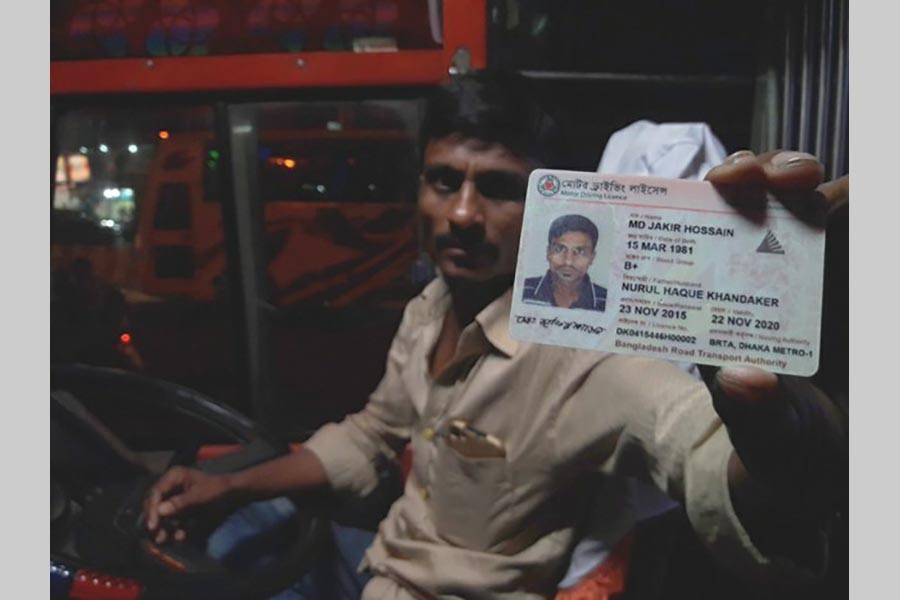Road transport workers are employed in different kinds of vehicles such as buses, mini-buses, trucks, covered-vans, tank-lorries etc. in the roles of driver, helper, conductor or supervisor. They belong to various age-groups, ranging from 10 year-old children to 70 year-old veterans. Females are, however, conspicuous by their absence. A few may have some kind of schooling, but the majority are uneducated or illiterate. As this trade does not enjoy any prestige in society, therefore becoming a transport worker by choice is very rare. Teenagers are mostly forced to join this profession due to poverty, family break-ups, disinterest in education, and on being left spoiled by bad companies. Their task becomes easier as this profession does not require any qualification. Especially for boys growing up in urban slums and in dire need of money, becoming road transport worker or bearer in hotels is an easy option. It may also appear exciting to some, but it does not enhance family tradition. Normally, no road transport worker would want his child to join the profession. But some are forced to do so under compulsions.
The ustad-disciple relationship is very important in this trade. Usually, nobody comes here on receiving training and getting driving licences. A newcomer starts as a 'helper', and usually addresses the driver as 'ustad' or guru. Helpers perform all kinds of tasks including giving verbal direction to the driver while the vehicle is moving, washing it, changing tyres, bringing tea, cigarette etc. for ustad, and so on. They even arrange drugs for those drivers who are addicted. When an ustad becomes satisfied with the disciple, he gives him a chance to sit at the steering wheel. The driving skills of the helper ripen by utilising chances like bringing out the vehicle from the terminal, taking it to the workshop, driving during long queue of trucks, etc. In this way, his expertise in driving flourishes. A helper gradually becomes a driver over a long stretch of time. Lacking in formal training, he receives practical training for a period ranging from one to five years. Therefore, a teenage boy of fifteen years can become a driver after practising and utilising the chances offered by his ustad for one to five years. Even after becoming a driver, the erstwhile helper continues to hold the 'ustad' in high esteem and reverence.
In case of matrimony, transport workers face difficulty in marrying outside their profession, as they do not enjoy a good reputation in society and are often considered unsafe. They usually find their partners from families of elder transport workers. With regard to dresses, the drivers prefer Lungi, as they have to remain seated for a long stretch. On the other hand, helpers usually wear trousers. They are forced to take food mostly from hotels, many of which lack wash-rooms. There is also no specialised hospital for treatment of workers who are injured in accidents. Neither do they get any medical allowance. There is also no rest-room for them either in the terminals or at other places. Many of them have to sleep inside vehicles, as they do not have sufficient money to stay in hotels. This also serves the purpose of guarding the vehicles during off-hours. In cities and towns, most of these workers lead a sub-human life by staying in slums.
There is a wrong perception among some city-dwellers that transport workers earn a lot. In case of long distance buses and trucks, drivers, helpers and supervisors earn trip-based commissions for only 15 days a month. For drivers, the amount ranges from Taka 1200 to Taka 1500 per trip. This translates into Taka 18,000 to Taka 22,500 per month. The drivers who drive vehicles in cities earn between Taka 1,000 and Taka 1,200 per day. The supervisors or conductors get between Taka 700 and Taka 800, while the helpers earn between Taka 400 and Taka 500 per day. They do not get any bonus, but are often forced to work even during festivals. Although transport workers earn on a daily basis, they have to incur expenses for house rents, power bills, and school fees for children etc. on a monthly basis. Therefore, running a family becomes an uphill task for them. There is also a complete lack of job security, as their job is often dependent on the whims of vehicle owners.
The government passed a law titled 'Privately-owned road transport workers' welfare fund act, 2005'. Workers under this act imply drivers, cleaners, conductors and checkers appointed under the Motor Vehicles Ordinance, 1983. A workers' welfare fund was also constituted under the law in 2013, which is supposed to extend financial assistance to adversely affected workers including victims of accidents. But an appointment letter and recommendation of the labour union is required for receiving assistance from the fund. Therefore, most of the workers do not get assistance in the absence of appointment letters.
Evidently, the road transport workers are one of the most neglected segments of society. The existence of around 7.0 million workers implies the involvement of about 7.0 million families. Therefore, the lot of at least 20 million people is dependent on the well-being of these workers. But unfortunately, they are often looked down upon. On the other hand, their bosses make fortunes and build political careers by using them as tools. Many people are often vocal about upholding the rights and fair wages of garments workers. But generally, no one speaks in favour of transport workers, not even their trade union leaders. The owners exploit them year after year mainly because of their silence. But we should not forget that they are no different from other workers, and the rate of fatalities on roads could be reduced if we could improve their living standards and working conditions.


